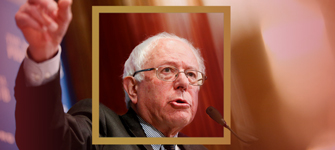Vermont Senator Bernie Sanders, who is currently fiercely gnawing on the back of the neck of former first lady Hillary Clinton for the Democratic presidential nomination, has become one of the leading candidates in the eyes of marijuana policy reformers across the United States. This is mostly due to his willingness to overhaul the criminal justice system – wanting to prevent minor drug offenders from seeing the inside of prisons – and his desire to bring down more than forty years of decay brought forth by President Nixon’s extreme prejudice against the average stoner.
Although Sanders originally launched his campaign for the presidency with a toe-in-the-water approach to the concept of legalization, saying only that it was time to “rethink the so-called War on Drugs,” his attitude towards the issue quickly flourished into a full throttle hammer of domination. In 2015, along with the submission of a bill aimed at ending private prisons, Sanders took a bold leap with the introduction of a bill in the Senate aimed at doing what no other U.S. Senator in American history has dared to do – eliminate cannabis from the DEA’s Controlled Substances Act (CSA) and legalize marijuana in all 50 states.
The proposal entitled the “Ending Federal Marijuana Prohibition Act” was crafted similar to another bill introduced in the House in early 2015 by Representative Jared Polis of Colorado. Essentially, the proposal was designed to allow states the freedom to legalize marijuana for medicinal or recreational purposes without catching heat for participating in activities deemed illegal by the federal government. The language indicates that “marijuana” would be deregulated from the confines of the CSA, which in turn, would prevent the DEA from crashing in on businesses and individuals participating in pot-related affairs because all of the regulations pertaining to these matters would exist solely in the hands of individual states.
"It's a state and a federal issue,” Sanders said in an interview with CNN. “The federal issue is that we should remove marijuana from the Controlled Substance Act. That's a federal decision. The state decision is that we live in a federal system of government where issues like tobacco and alcohol are significantly regulated by the states. And I think that is a province of the states."
Unfortunately, there has not been any action on Sanders’ proposal since it was referred to committee at the beginning of November. But the effort remains a testament to the level of reform this presidential hopeful is interested in putting on the books.
But if Bernie Sanders becomes the next President of the United States – couldn’t he just sign an executive order and effectively legalize weed for the entire country, once and for all?
While that would be nice, even a President Sanders would not have the authority to walk into the White House in 2017 and put an end to marijuana prohibition in one fell swoop. In fact, the most Sanders could do from the Oval Office is to initiate the process to have the herb rescheduled under the Controlled Substances Act.
Contrary to what some might believe, only Congress has the power to enact legislation to amend the language of the CSA – moving marijuana to a different Schedule or removing it from the Schedules altogether.
According to the Brookings Institution, before even a modest downgrade from a Schedule I classification could take place, Sanders would need to submit a petition to reschedule cannabis with the Attorney General. It would then be forwarded to the Secretary of Health and Human Services to be evaluated by the U.S. Food and Drug Administration, and likely the DEA. Those agencies would take several factors into consideration, such as the potential health risks associated with marijuana, before offering a recommendation, of any kind, for a Schedule reduction.
Unfortunately, there are no guarantees a positive recommendation would even result from this course of action – not even with a president standing over the shoulders of federal officials.
At best, it is possible the authority of a President Sanders could lead to marijuana being moved from a Schedule I to a Schedule II, but this is not likely to happen because a change of this magnitude would be considered a violation of international drug treaties. And as John Kirby, a spokesman for the U.S. Department of State, said in a recent press briefing, the U.S. Government is “firmly committed to the three UN drug conventions.”
Some people refuse to accept that the UN has any control over the legalization of marijuana in the United States, but legal experts argue the treaties are more binding than most think.
“The United States is actually very limited in what it can legally do vis–à–vis its international treaty obligations, regardless of what policy changes make sense for its own citizens,” according to a committee with the New York Bar Association specializing in international law.
Despite the potential hang-ups with the UN, it will be crucial for the next president to make further advancements in the realm of marijuana reform than the Obama Administration has throughout the past eight years. Hopefully, these changes involve concrete policy changes rather than meaningless memos and half-assed restrictions built into the federal budget. The consensus among so-called policy experts is that regardless of outcome of November’s presidential election, the federal government is going to continue to allow states to legalize the leaf without any major issues. Yet, we anticipate the most growth under the leadership of a President Sanders.
The Iowa Caucuses, one of the most important stops along the 2016 presidential campaign trail, are February 1. The outcome of this event should provide us with a relatively good indication as to whether Sanders has a fighting chance at being selected to take part in the big race later this year.











